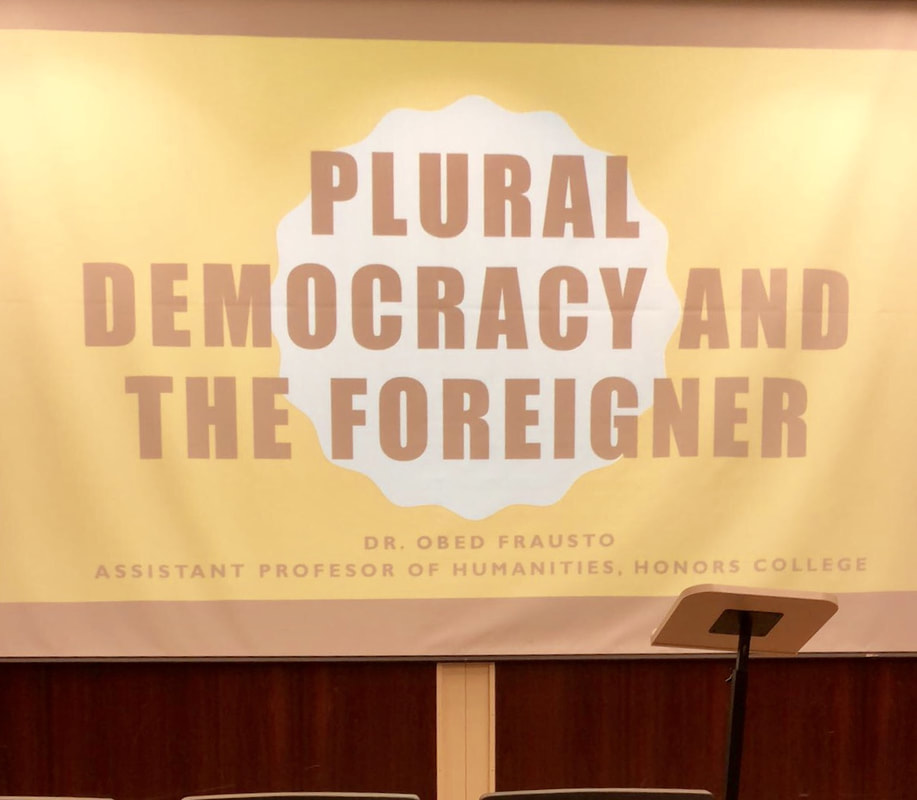Frausto’s lecture, titled Plural Democracy and the Foreigner, interrogated dominant structures in the United States, such as the “melting pot” narrative, white democracy and tyranny, belief in the “American Dream,” and notions of cultural recognition and citizenship in the States.
A graduate of and former professor at the National Autonomous University of Mexico in Mexico City, Dr. Frausto said that he has always been interested in the dichotomous term “foreigner.” This term became increasingly important to him in the midst of the 2016 election, with President Trump’s anti-Mexican rhetoric and the racial profiling he had personally experienced.
“I remember walking to my Airbnb from a conference in Lexington, and I had my hands in my pockets—it was November, and I was cold—and someone shouted from their car, ‘Hey, get your hands out of your pockets!’ I realized I had been profiled, that they thought I had—I don’t know—a weapon, or something? That’s always stuck with me,” Frausto said.
Frausto began with the myth of the melting pot, presenting a literature review of the historical critique of the term. The first critique came in 1915 from author Horace Kallen in their text “Democracy Versus the Melting Pot.” In this text, Kallen argues that “melting pot” narratives allow policy makers to ignore racial injustice, negate diversity and cultural pluralism, and that assimilation harms foreigners, denying them their language, traditions, cultures, and identities.
Melting pot critique also drew from prominent Chicana scholar Gloria Anzaldúa and her formative text Borderlands / La Frontera, a book which explores linguistic terrorism. Frausto defined linguistic terrorism as “Using violence and coercion to shame bodies and language.”
Another topic was white democracy and white tyranny. Frausto framed this section of the lecture through Alexis de Tocqueville’s text Democracy in America. de Tocqueville, a prominent French thinker who visited the United States to study its prison systems, asserts that there are numerous glaring contradictions in the United States between democratic and egalitarian values. The consequences of this, then, are that Native Americans, Black citizens, and other racial minorities are not represented by “U.S. democracy”. Instead, democracy represents the tyranny of a white majority, allowing it to persist.
Frausto then wondered how we eliminate racial prejudice. Here, Frausto cited Iris Marion Young and their belief that justice is not a passive construct, but an active one. Next, Hegel’s master-slave dialectic was cited, noting that many are still fighting for recognition by dominant society. Finally, Frausto cited the Abolition of White Democracy, which argues racial structures are organized by hierarchies, power, and political discrimination. When positing solutions to eliminate this prejudice, Frausto stressed the importance of political activism, the fight of racial minorities for recognition, and more.
The last narrative critiqued was the American Dream. Frausto’s reading of the American Dream was complex, torn between the notion that it simply does not exist and its various interpretations in popular literature. For example, Frausto cited Lawrence Samuel’s The American Dream: A Cultural History, which suggests the American Dream consists of values of self-reliance, freedom, and autonomy, but also privileges success, money, and ownership.
Finally, Frausto concluded pondering cultural recognition and a culture of acceptance. Frausto stated that democracy must consider multiculturalism through solidarity, fellowship, and belonging—thus shunning the individualistic and materialistic notions embedded within the American Dream. In constructing a democratic culture of acceptance, Frausto had four points to offer:
“First, we must appreciate and understand different approaches. Second, We have to engage in dialogue with people from different backgrounds. Third, we must increase knowledge of cultural differences by publishing the history of immigrants. And finally, we have to confront policies using immigrants as scapegoats.”
The next Honors College Lecture Series will take place at the end of April.


 RSS Feed
RSS Feed
